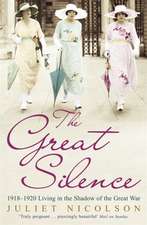Consumption and the Making of Respectability, 1600-1800
Autor Woodruff Smithen Limba Engleză Paperback – 28 iun 2002
| Toate formatele și edițiile | Preț | Express |
|---|---|---|
| Paperback (1) | 364.54 lei 43-57 zile | |
| Taylor & Francis – 28 iun 2002 | 364.54 lei 43-57 zile | |
| Hardback (1) | 1007.23 lei 43-57 zile | |
| Taylor & Francis – 28 iun 2002 | 1007.23 lei 43-57 zile |
Preț: 364.54 lei
Nou
Puncte Express: 547
Preț estimativ în valută:
69.75€ • 73.02$ • 57.72£
69.75€ • 73.02$ • 57.72£
Carte tipărită la comandă
Livrare economică 07-21 aprilie
Preluare comenzi: 021 569.72.76
Specificații
ISBN-13: 9780415933292
ISBN-10: 0415933293
Pagini: 352
Dimensiuni: 152 x 229 x 19 mm
Greutate: 0.65 kg
Ediția:New.
Editura: Taylor & Francis
Colecția Routledge
Locul publicării:Oxford, United Kingdom
ISBN-10: 0415933293
Pagini: 352
Dimensiuni: 152 x 229 x 19 mm
Greutate: 0.65 kg
Ediția:New.
Editura: Taylor & Francis
Colecția Routledge
Locul publicării:Oxford, United Kingdom
Recenzii
"Woodruff Smith's book is the first systematic historical study of the consumer revolution that took place in the Occident between 1600 and 1800. Here Smith casts must needed light on why and how the new commodities were socially assimilated in European societies, and tries to explain the pattern of consumer revolution from a wide historical perspective. He takes into account not only the consumption itself but also the social context in which the transformation took place during a critical phase of world history. The book will be valuable to all students of modern cultural history." -- K.N. Chaudhurt, European University, Florence
"That large sections of the world were conquered to obtain marginal amounts of luxury products seems improbable. Yet, that is what happened and historians have failed to provide us with an explanation for this seemingly irrational behavior. Smith has filled this void by his careful analysis of the social importance of certain exotic consumer items showing that the pursuit of "gentility," "rational masculinity," "domestic femininity," and "respectability" created an extremely powerful demand. For too long we have believed in the overriding weight of economics while neglecting the importance of culture behind it. Smith has put the balance right again." -- Pieter C. Emmer, University of Leiden, The Netherlands
"Woodruff D. Smith's book draws on many fine recent monographs to analyze Western European consumption of the early modern period's archetypal new goods: cotton and pepper, sugar and coffee, tea and tobacco. This book begins with an excellent question: a question originally posed...by a student at the end of class. Teaching about imperialsim, Smith had just finished his lecture on the enormous eighteenth century expansion in European imports of colonial good produced by slaves. "But why did people in Europe want all that sugar?" asked a student (p.2). The book's strength lies in its willingness to address this question, in its effort to bring human motivation into the history of economic and social transformation." -- Rebecca L. Spange, University College London strength lies in its willingness to addre
"This work represents a considerable contribution to the field of debate and should be consulted by anyone who plans to write on consumption in early modern Europe...There is much originality in the extended discussions of economic, social, or cultural behavior, and much merit in the author's insistence that the concepts behind consumer demand have to be properly exmained before they can be bandied about as explanations." -- Journal of Modern History
"That large sections of the world were conquered to obtain marginal amounts of luxury products seems improbable. Yet, that is what happened and historians have failed to provide us with an explanation for this seemingly irrational behavior. Smith has filled this void by his careful analysis of the social importance of certain exotic consumer items showing that the pursuit of "gentility," "rational masculinity," "domestic femininity," and "respectability" created an extremely powerful demand. For too long we have believed in the overriding weight of economics while neglecting the importance of culture behind it. Smith has put the balance right again." -- Pieter C. Emmer, University of Leiden, The Netherlands
"Woodruff D. Smith's book draws on many fine recent monographs to analyze Western European consumption of the early modern period's archetypal new goods: cotton and pepper, sugar and coffee, tea and tobacco. This book begins with an excellent question: a question originally posed...by a student at the end of class. Teaching about imperialsim, Smith had just finished his lecture on the enormous eighteenth century expansion in European imports of colonial good produced by slaves. "But why did people in Europe want all that sugar?" asked a student (p.2). The book's strength lies in its willingness to address this question, in its effort to bring human motivation into the history of economic and social transformation." -- Rebecca L. Spange, University College London strength lies in its willingness to addre
"This work represents a considerable contribution to the field of debate and should be consulted by anyone who plans to write on consumption in early modern Europe...There is much originality in the extended discussions of economic, social, or cultural behavior, and much merit in the author's insistence that the concepts behind consumer demand have to be properly exmained before they can be bandied about as explanations." -- Journal of Modern History
Cuprins
Acknowledgements
Abbreviations
Introduction
CH APTER ONE: CONSUMPTION AND CULTURE
Changes in Consumption Patterns in Early Modern Europe
Culture and the Contexts of Consumption
Cultural Contexts
Components of Cultural Contexts
Meaning in Cultural Contexts
Changes in Cultural Contexts
CHAPTER TWO: GENTILITY
Samuel Pepys, Gentleman
Modes of Gentility
Silks and Calicos
Underclothing
CHAPTER THREE: LUXURY
The Context of Luxury in Early Modern Europe
Taste
Comfort and Convenience
Spices of Life
Sugar
The Contexts of Condiment Consumption
CHAPTER FOUR: VIRTUE
Dr. Blankaart's Prescription for Healthy Living
The Discourse of Virtue
Bourgeois Virtue
Tea, Coffee and Sugar
Cleanliness
CHAPTER FIVE: RATIONAL MASCULINITY
Coffeehouses
Coffee and the Context of Rational Masculinity
Tobacco
CHAPTER SIX: DOMESTIC FEMININITY
Tea and Sympathy
Femininity, Domesticity and Separate Spheres
Civilization
Domesticity and Consumption
Breakfast
CHAPTER SEVEN: RESPECTABILITY
Modern Times
Respectability, Social Structure and Individual Status
Respectable Families
Respectability, Institutions and Professions
CHAPTER EIGHT: CONCLUSION
Gentility, Luxury and Virtue
Makers of Respectability
Rational Masculinity and Domestic Femininity
Implications and Further Questions
Tables
Bibliography
Abbreviations
Introduction
CH APTER ONE: CONSUMPTION AND CULTURE
Changes in Consumption Patterns in Early Modern Europe
Culture and the Contexts of Consumption
Cultural Contexts
Components of Cultural Contexts
Meaning in Cultural Contexts
Changes in Cultural Contexts
CHAPTER TWO: GENTILITY
Samuel Pepys, Gentleman
Modes of Gentility
Silks and Calicos
Underclothing
CHAPTER THREE: LUXURY
The Context of Luxury in Early Modern Europe
Taste
Comfort and Convenience
Spices of Life
Sugar
The Contexts of Condiment Consumption
CHAPTER FOUR: VIRTUE
Dr. Blankaart's Prescription for Healthy Living
The Discourse of Virtue
Bourgeois Virtue
Tea, Coffee and Sugar
Cleanliness
CHAPTER FIVE: RATIONAL MASCULINITY
Coffeehouses
Coffee and the Context of Rational Masculinity
Tobacco
CHAPTER SIX: DOMESTIC FEMININITY
Tea and Sympathy
Femininity, Domesticity and Separate Spheres
Civilization
Domesticity and Consumption
Breakfast
CHAPTER SEVEN: RESPECTABILITY
Modern Times
Respectability, Social Structure and Individual Status
Respectable Families
Respectability, Institutions and Professions
CHAPTER EIGHT: CONCLUSION
Gentility, Luxury and Virtue
Makers of Respectability
Rational Masculinity and Domestic Femininity
Implications and Further Questions
Tables
Bibliography
Notă biografică
Woodruff Smith is Professor in the department of History at the University of Massachusetts, Boston. He is the author of Politics and the Sciences of Culture in Germany, 1840-1920 , The Ideological Origins of Nazi Imperialism , and European Imperialism in the Nineteenth and Twentieth Centuries .
Descriere
Tying together of several distinct cultural patterns during this century to create a culture of respectability and its impact on popular culture, trade, politics, social dynamics, and literature, this original and thoughtful work provides a comprehensive and much-needed understanding of the origins of modern consumption and all of its cultural implications.

























